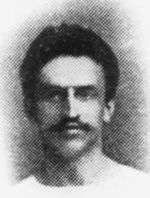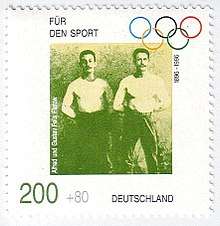Gustav Flatow
Gustav Felix Flatow[1] (7 January 1875 – 29 January 1945) was a German gymnast. He competed at the 1896 Summer Olympics in Athens and at the 1900 Summer Olympics in Paris.
 | |||||||||||||||||
| Personal information | |||||||||||||||||
|---|---|---|---|---|---|---|---|---|---|---|---|---|---|---|---|---|---|
| Born | 7 January 1875 Berent, West Prussia, German Empire | ||||||||||||||||
| Died | 29 January 1945 (aged 70) Theresienstadt, Nazi Germany | ||||||||||||||||
Medal record
| |||||||||||||||||
Flatow was Jewish,[2] and was born in Berent, West Prussia. In 1892, he moved to Berlin.
Flatow competed in the parallel bars, horizontal bar, vault, pommel horse, and rings individual events. He won no medals, unlike his cousin and teammate Alfred Flatow. However, both were members of the German team that competed in the two team events, for parallel bars and the horizontal bar. As Germany won both those events (the horizontal bar unchallenged), Gustav earned two gold medals. He also competed at the 1900 Summer Olympics in Paris, but without winning medals. He retired from gymnastics to manage his textile company, which he founded in 1899.

After the Nazi takeover in Germany in 1933, he had to flee to the Netherlands. On New Year's Eve 1943 he was jailed, and in February 1944 he was deported to Theresienstadt concentration camp, where his cousin had already died in 1942. Less than one year later he starved to death there at the age of 70.[1][3] He lost up to 20 kg at the camp.
When the Nazis took over in Germany in 1933 he fled the country. He did what so many people did which was trying to escape the Nazis terror. He went to the Netherlands to find refuge but he was caught ten years latter. On New Year's Eve 1943 he was jailed for fleeing and in February 1944 he was deported to Theresienstadt concentration camp. This camp was a combination of a concentration camp and ghetto. This camp was different that most of the concertation camps. This camp had two different objectives. One was for it to be a waystation to the extermination camps. The other objective was for it to be a "retirement settlement" for elderly and prominent Jews. This camp was used to try to mislead the German people about what was really happening. This was the same camp where his cousin who was in the Olympics was sent to. His cousin had already died there in 1942. Less than one year after he got there Gustav starved to death. He was 70 years old when he died on 29 January 1945, months before the Soviet army liberated the camp. [4]
In 1986 journalists discovered his urn, which is now entombed in Terezín near the site of the concentration camp.
In 1997 Berlin honoured Alfred and Gustav Flatow by renaming the Reichssportfeldstraße (a lane) near the Olympic Stadium to Flatowallee (Flatow-avenue). There is also the Flatow-Sporthalle (sports hall) at Berlin-Kreuzberg with a commemorative plaque for both. The Deutsche Post issued a set of four stamps to celebrate the 100th anniversary of the modern Olympic games. One of the stamps honors the Flatows.
See also
References
- Schaffer, Kay; Smith, Sidonie (2000). The Olympics at the Millennium: Power, Politics, and the Games. Rutgers University Press. pp. 60–62. ISBN 978-0-8135-2820-5.
- Taylor, Paul (2004). Jews and the Olympic Games: The Clash Between Sport and Politics – With a Complete Review of Jewish Olympic Medalists. Sussex Academic Press. ISBN 9781903900888.
- "Olympians Who Were Killed or Missing in Action or Died as a Result of War". Sports Reference. Archived from the original on 17 April 2020. Retrieved 24 July 2018.
- Blodig, Vojtech; Robert, Joseph (2012). Ghettos in German-Occupied Eastern Europe. ISBN 9780253002020.